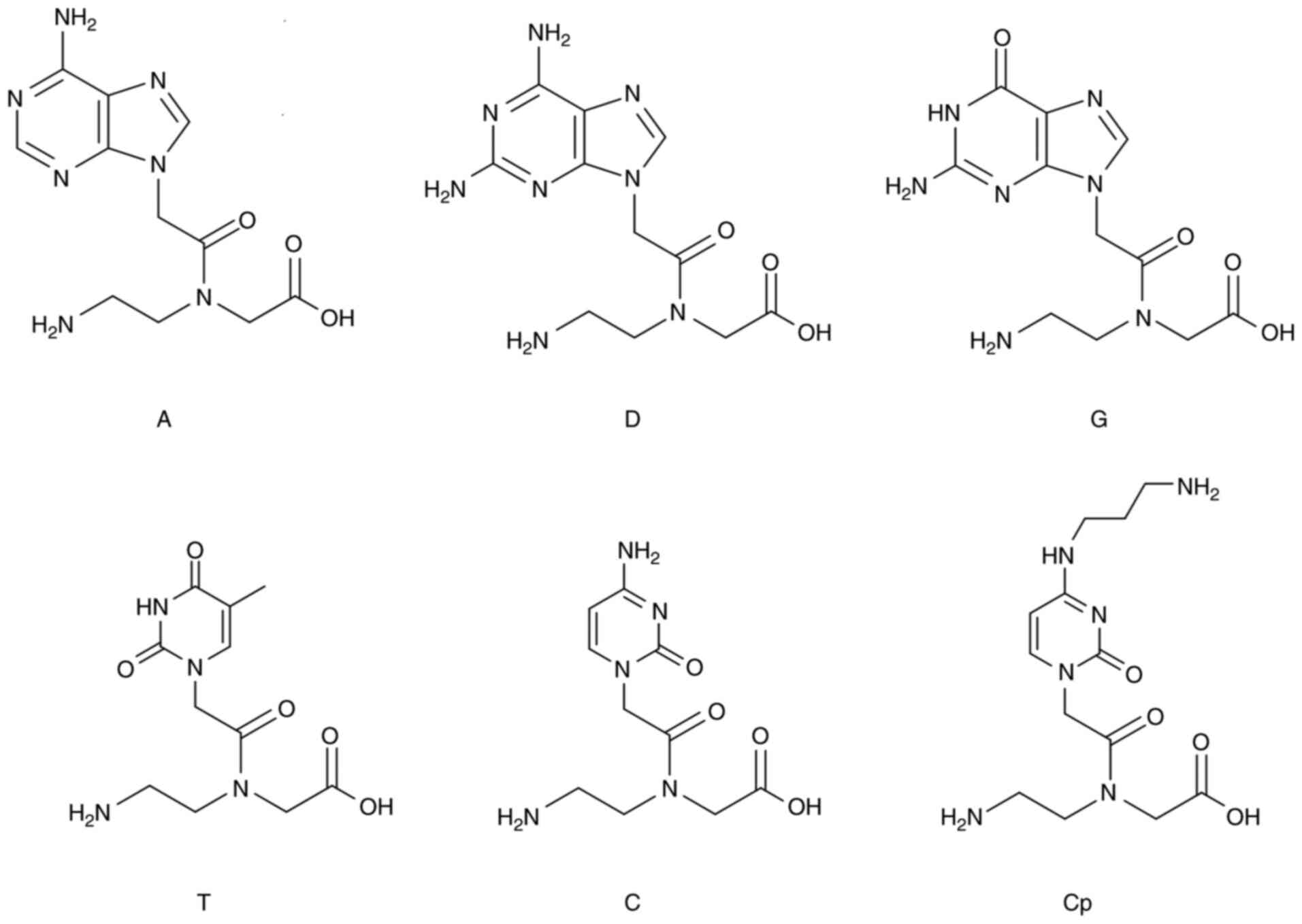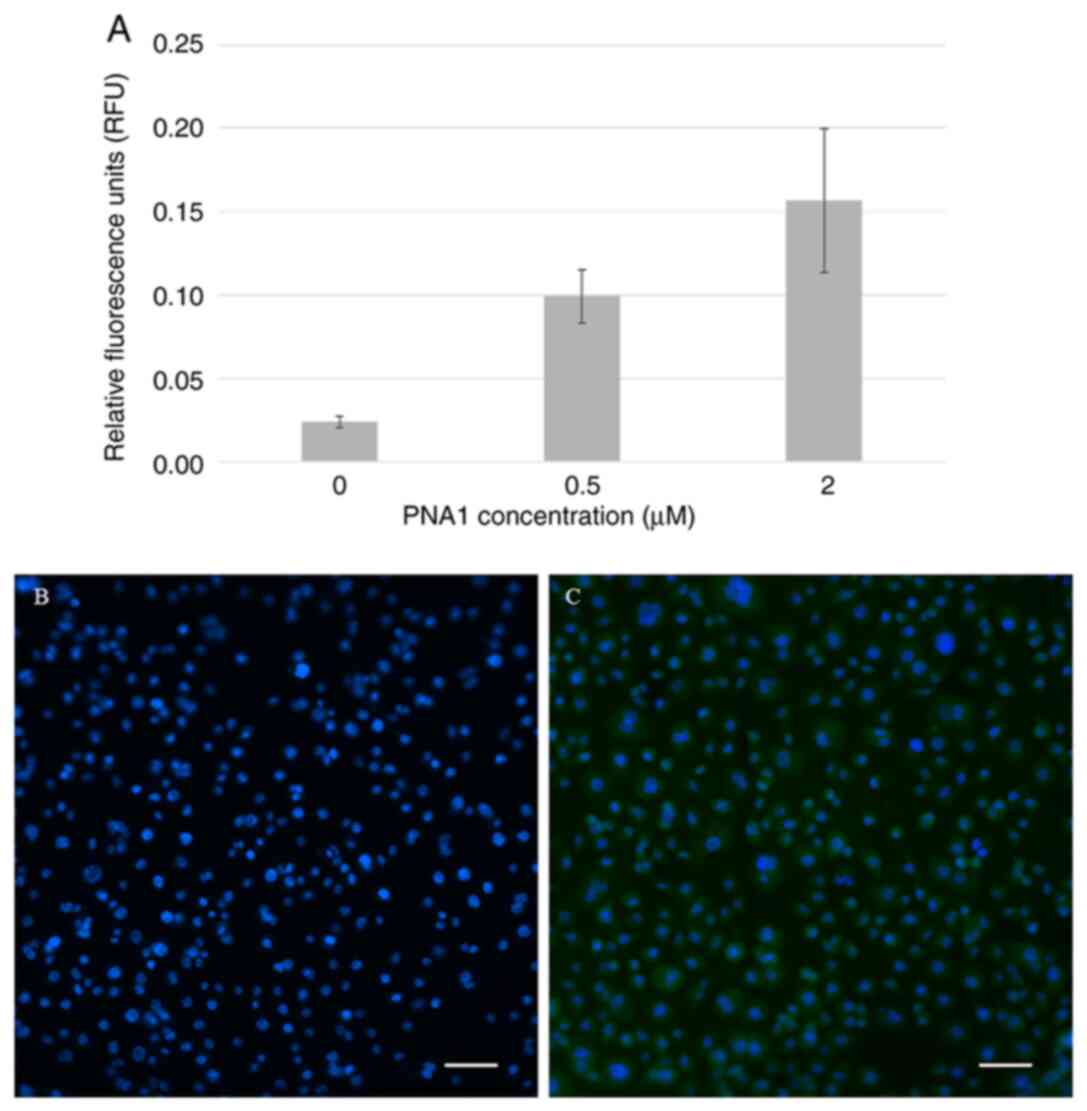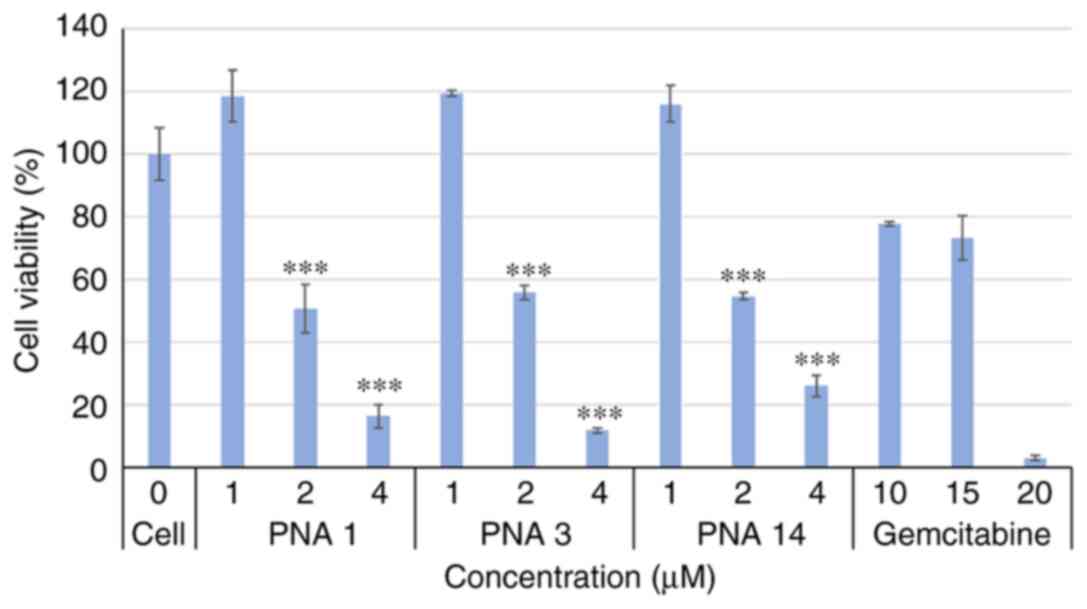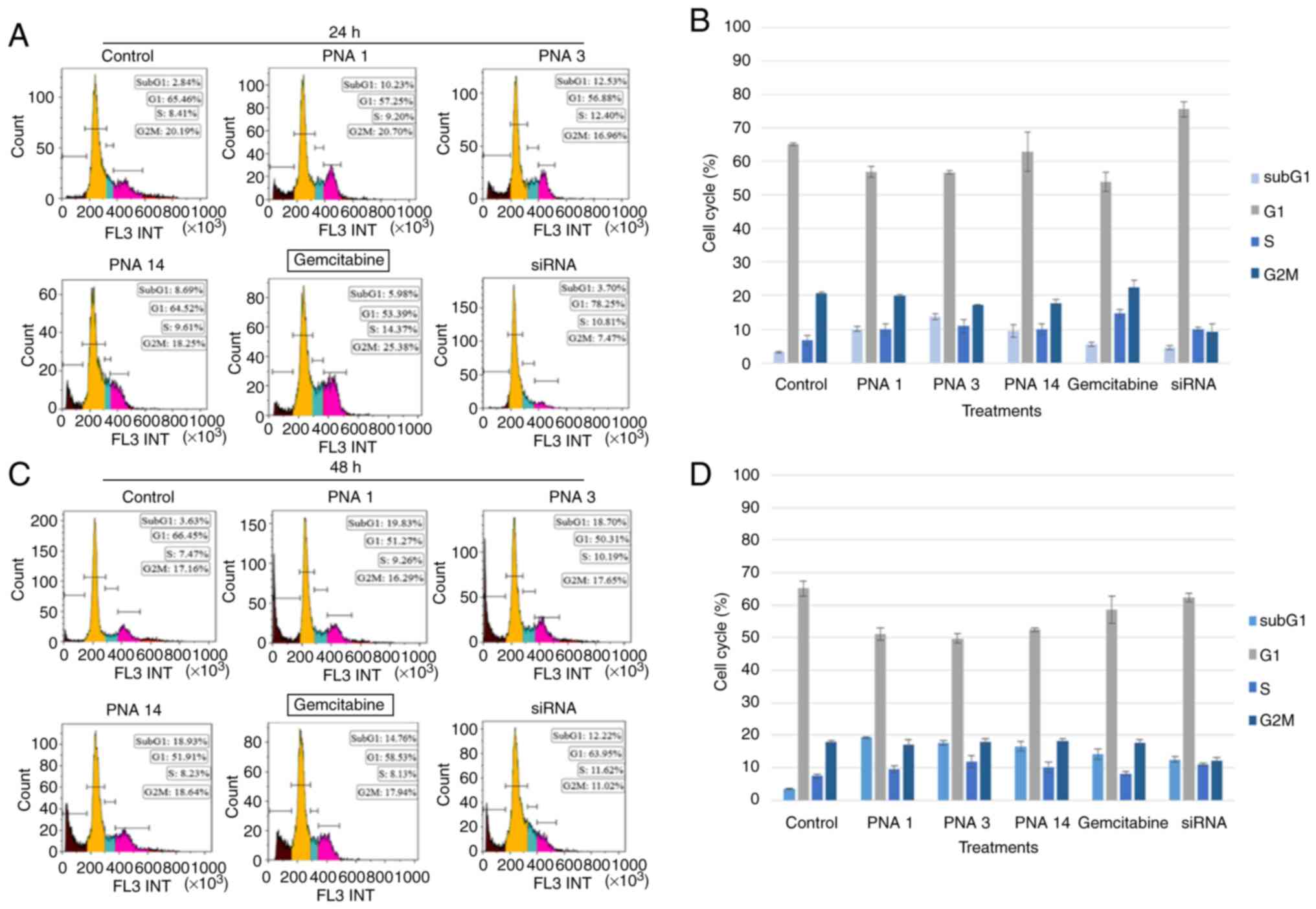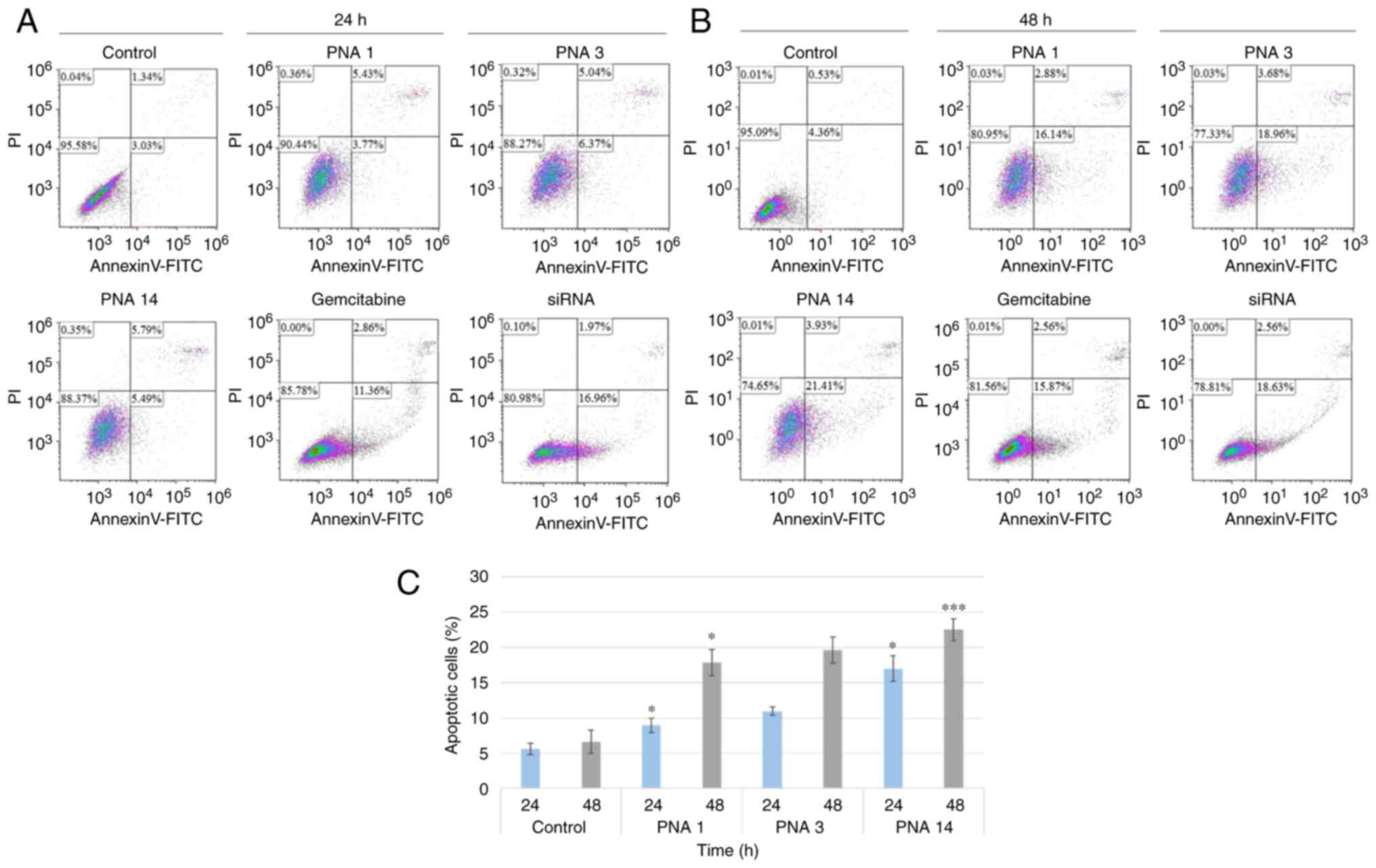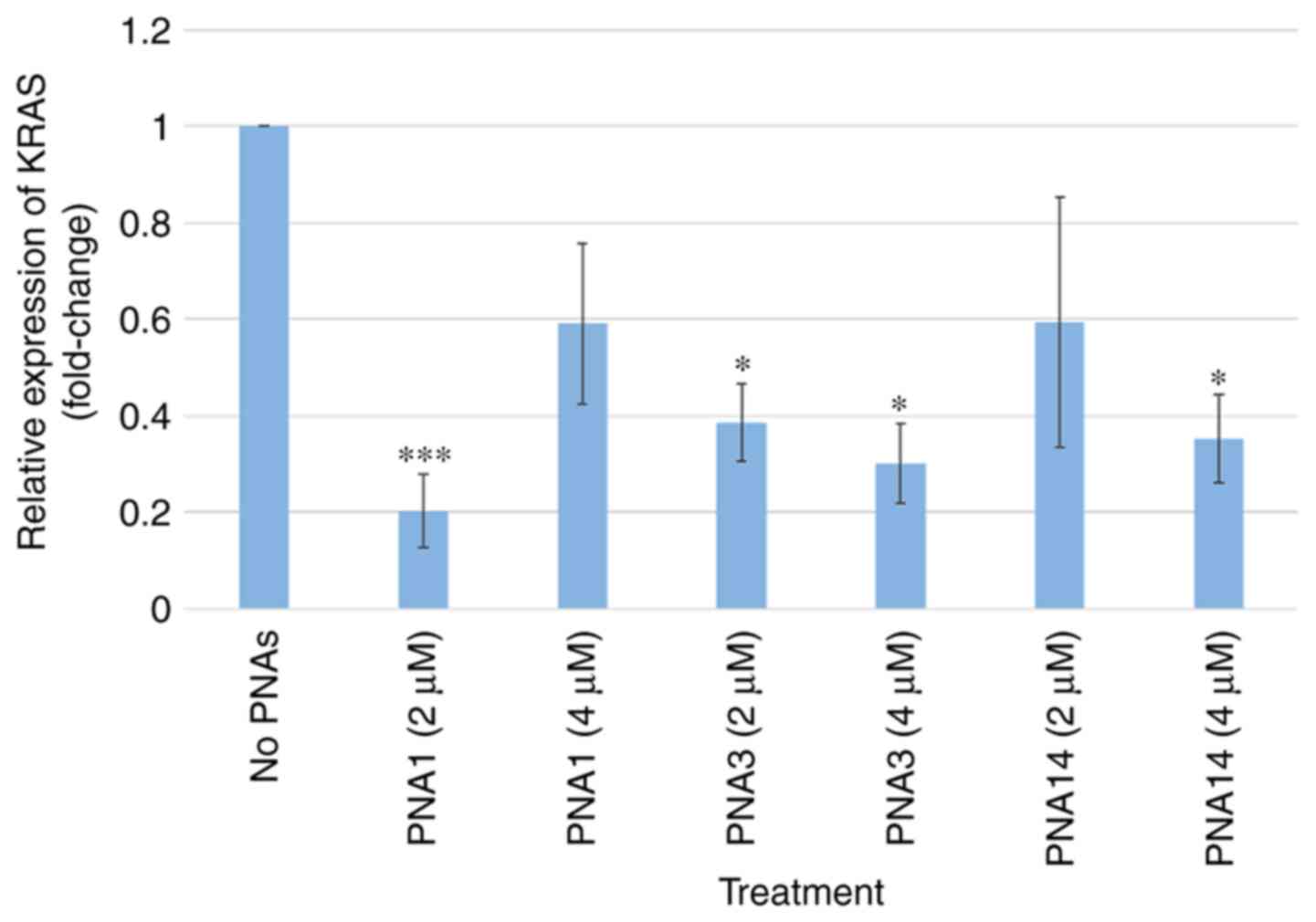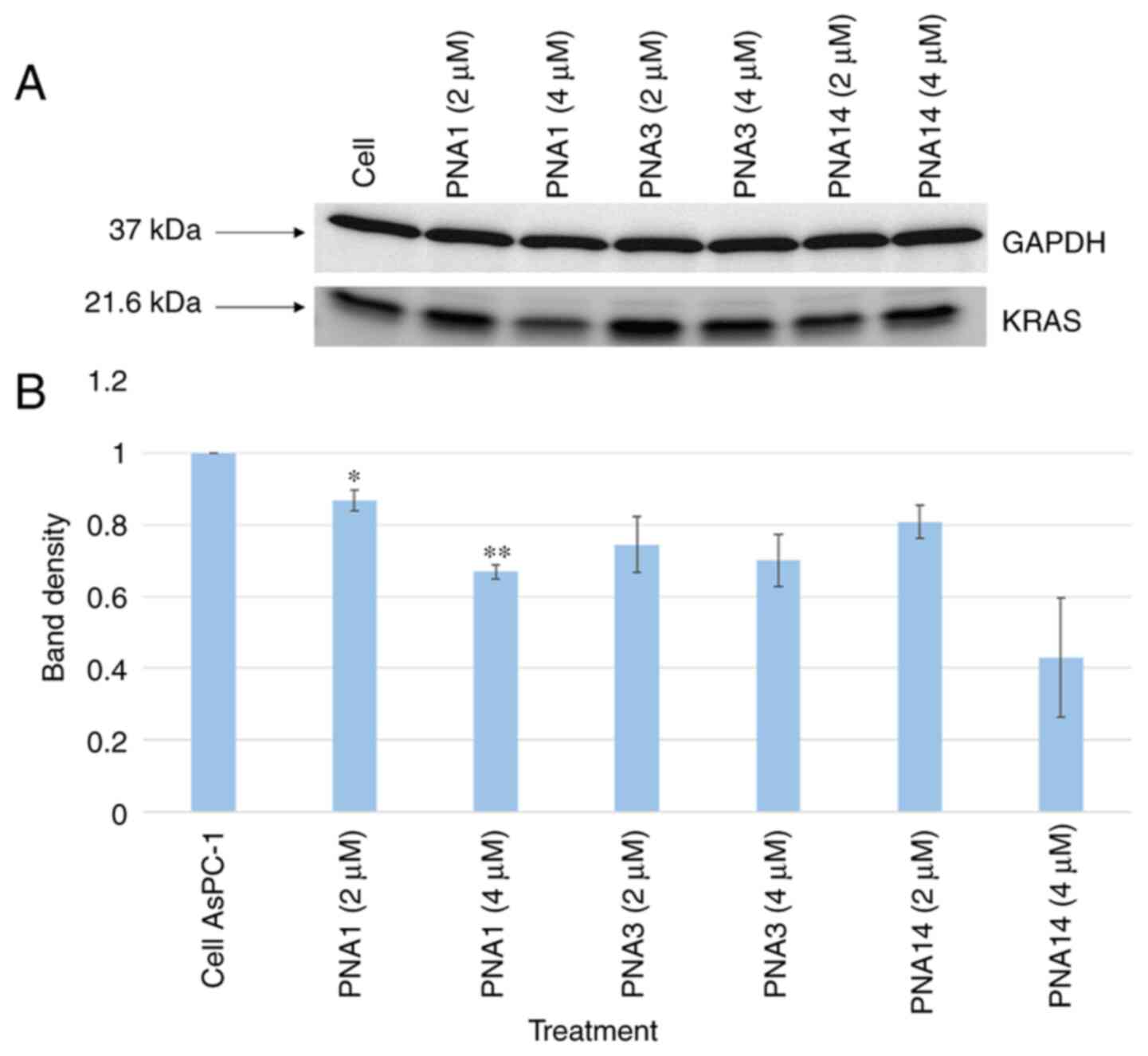|
1
|
Prior IA, Lewis PD and Mattos C: A
comprehensive survey of Ras mutations in cancer. Cancer Res.
72:2457–2467. 2012. View Article : Google Scholar : PubMed/NCBI
|
|
2
|
Fernández-Medarde A and Santos E: Ras in
cancer and developmental diseases. Genes Cancer. 2:344–358. 2011.
View Article : Google Scholar : PubMed/NCBI
|
|
3
|
Cox AD, Fesik SW, Kimmelman AC, Luo J and
Der CJ: Drugging the undruggable RAS: Mission possible? Nat Rev
Drug Discov. 13:828–851. 2014. View
Article : Google Scholar : PubMed/NCBI
|
|
4
|
Tsiatis AC, Norris-Kirby A, Rich RG, Hafez
MJ, Gocke CD, Eshleman JR and Murphy KM: Comparison of Sanger
sequencing, pyrosequencing, and melting curve analysis for the
detection of KRAS mutations: Diagnostic and clinical implications.
J Mol Diagn. 12:425–432. 2010. View Article : Google Scholar : PubMed/NCBI
|
|
5
|
Pylayeva-Gupta Y, Grabocka E and Bar-Sagi
D: RAS oncogenes: Weaving a tumorigenic web. Nat Rev Cancer.
11:761–774. 2011. View
Article : Google Scholar : PubMed/NCBI
|
|
6
|
Singh H, Longo DL and Chabner BA:
Improving prospects for targeting RAS. J Clin Oncol. 33:3650–3659.
2015. View Article : Google Scholar : PubMed/NCBI
|
|
7
|
Liu P, Wang Y and Li X: Targeting the
untargetable KRAS in cancer therapy. Acta Pharm Sin B. 9:871–879.
2019. View Article : Google Scholar : PubMed/NCBI
|
|
8
|
Buscail L, Bournet B and Cordelier P: Role
of oncogenic KRAS in the diagnosis, prognosis and treatment of
pancreatic cancer. Nat Rev Gastroenterol Hepatol. 17:153–168. 2020.
View Article : Google Scholar : PubMed/NCBI
|
|
9
|
Simanshu DK, Nissley DV and McCormick F:
RAS proteins and their regulators in human disease. Cell.
170:17–33. 2017. View Article : Google Scholar : PubMed/NCBI
|
|
10
|
Scheffzek K, Ahmadian MR, Kabsch W,
Wiesmüller L, Lautwein A, Schmitz F and Wittinghofer A: The
Ras-RasGAP complex: Structural basis for GTPase activation and its
loss in oncogenic Ras mutants. Science. 277:333–338. 1997.
View Article : Google Scholar : PubMed/NCBI
|
|
11
|
Bos JL, Rehmann H and Wittinghofer A: GEFs
and GAPs: Critical elements in the control of small G proteins.
Cell. 129:865–877. 2007. View Article : Google Scholar : PubMed/NCBI
|
|
12
|
Hong DS, Fakih MG, Strickler JH, Desai J,
Durm GA, Shapiro GI, Falchook GS, Price TJ, Sacher A, Denlinger CS,
et al: KRASG12C inhibition with sotorasib in advanced
solid tumors. N Engl J Med. 383:1207–1217. 2020. View Article : Google Scholar : PubMed/NCBI
|
|
13
|
Liu F, Yang X, Geng M and Huang M:
Targeting ERK, an Achilles' Heel of the MAPK pathway, in cancer
therapy. Acta Pharm Sin B. 8:552–562. 2018. View Article : Google Scholar : PubMed/NCBI
|
|
14
|
Vallejo A, Perurena N, Guruceaga E, Mazur
PK, Martinez-Canarias S, Zandueta C, Valencia K, Arricibita A,
Gwinn D, Sayles LC, et al: An integrative approach unveils FOSL1 as
an oncogene vulnerability in KRAS-driven lung and pancreatic
cancer. Nat Commun. 8:142942017. View Article : Google Scholar : PubMed/NCBI
|
|
15
|
Ryan MB and Corcoran RB: Therapeutic
strategies to target RAS-mutant cancers. Nat Rev Clin Oncol.
15:709–720. 2018. View Article : Google Scholar : PubMed/NCBI
|
|
16
|
Takashima A and Faller DV: Targeting the
RAS oncogene. Expert Opin Ther Targets. 17:507–531. 2013.
View Article : Google Scholar : PubMed/NCBI
|
|
17
|
Zorde Khvalevsky E, Gabai R, Rachmut IH,
Horwitz E, Brunschwig Z, Orbach A, Shemi A, Golan T, Domb AJ, Yavin
E, et al: Mutant KRAS is a druggable target for pancreatic cancer.
Proc Natl Acad Sci USA. 110:20723–20728. 2013. View Article : Google Scholar : PubMed/NCBI
|
|
18
|
Ross SJ, Revenko AS, Hanson LL, Ellston R,
Staniszewska A, Whalley N, Pandey SK, Revill M, Rooney C, Buckett
LK, et al: Targeting KRAS-dependent tumors with AZD4785, a
high-affinity therapeutic antisense oligonucleotide inhibitor of
KRAS. Sci Transl Med. 9:eaal52532017. View Article : Google Scholar : PubMed/NCBI
|
|
19
|
Marin VL, Roy S and Armitage BA: Recent
advances in the development of peptide nucleic acid as a
gene-targeted drug. Expert Opin Biol Ther. 4:337–348. 2004.
View Article : Google Scholar : PubMed/NCBI
|
|
20
|
Gambari R: Peptide-nucleic acids (PNAs): A
tool for the development of gene expression modifiers. Curr Pharm
Des. 7:1839–1862. 2001. View Article : Google Scholar : PubMed/NCBI
|
|
21
|
Nielsen PE, Egholm M, Berg RH and Buchardt
O: Sequence-selective recognition of DNA by strand displacement
with a thymine-substituted polyamide. Science. 254:1497–1500. 1991.
View Article : Google Scholar : PubMed/NCBI
|
|
22
|
Rajasekaran P, Alexander JC, Seleem MN,
Jain N, Sriranganathan N, Wattam AR, Setubal JC and Boyle SM:
Peptide nucleic acids inhibit growth of Brucella suis in pure
culture and in infected murine macrophages. Int J Antimicrob
Agents. 41:358–362. 2013. View Article : Google Scholar : PubMed/NCBI
|
|
23
|
Abdel-Aziz M, Yamasaki T and Otsuka M:
Synthesis and hybridization property of novel 2′,5′-isoDNA mimic
chiral peptide nucleic acids. Bioorg Med Chem Lett. 13:1041–1043.
2003. View Article : Google Scholar : PubMed/NCBI
|
|
24
|
Koppelhus U and Nielsen PE: Cellular
delivery of peptide nucleic acid (PNA). Adv Drug Deliv Rev.
55:267–280. 2003. View Article : Google Scholar : PubMed/NCBI
|
|
25
|
Dean DA: Peptide nucleic acids: Versatile
tools for gene therapy strategies. Adv Drug Deliv Rev. 44:81–95.
2000. View Article : Google Scholar : PubMed/NCBI
|
|
26
|
De Cola C, Manicardi A, Corradini R, Izzo
I and De Riccardis F: Carboxyalkyl peptoid PNAs: Synthesis and
hybridization properties. Tetrahedron. 68:499–506. 2012. View Article : Google Scholar
|
|
27
|
Narenji H, Gholizadeh P, Aghazadeh M,
Rezaee MA, Asgharzadeh M and Kafil HS: Peptide nucleic acids
(PNAs): Currently potential bactericidal agents. Biomed
Pharmacother. 93:580–588. 2017. View Article : Google Scholar : PubMed/NCBI
|
|
28
|
Wang G and Xu XS: Peptide nucleic acid
(PNA) binding-mediated gene regulation. Cell Res. 14:111–116. 2004.
View Article : Google Scholar : PubMed/NCBI
|
|
29
|
Quijano E, Bahal R, Ricciardi A, Saltzman
WM and Glazer PM: Therapeutic peptide nucleic acids: Principles,
limitations, and opportunities. Yale J Biol Med. 90:583–598.
2017.PubMed/NCBI
|
|
30
|
Zhao XL, Chen BC, Han JC, Wei L and Pan
XB: Delivery of cell-penetrating peptide-peptide nucleic acid
conjugates by assembly on an oligonucleotide scaffold. Sci Rep.
5:176402015. View Article : Google Scholar : PubMed/NCBI
|
|
31
|
Lucarelli F, Marrazza G, Turner AP and
Mascini M: Carbon and gold electrodes as electrochemical
transducers for DNA hybridisation sensors. Biosens Bioelectron.
19:515–530. 2004. View Article : Google Scholar : PubMed/NCBI
|
|
32
|
Barluenga S and Winssinger N: PNA as a
biosupramolecular tag for programmable assemblies and reactions.
Acc Chem Res. 48:1319–1331. 2015. View Article : Google Scholar : PubMed/NCBI
|
|
33
|
Brandén LJ, Mohamed AJ and Smith CI: A
peptide nucleic acid-nuclear localization signal fusion that
mediates nuclear transport of DNA. Nat Biotechnol. 17:784–787.
1999. View Article : Google Scholar : PubMed/NCBI
|
|
34
|
Liang KW, Hoffman EP and Huang L: Targeted
delivery of plasmid DNA to myogenic cells via
transferrin-conjugated peptide nucleic acid. Mol Ther. 1:236–243.
2000. View Article : Google Scholar : PubMed/NCBI
|
|
35
|
Chiarantini L, Cerasi A, Fraternale A,
Millo E, Benatti U, Sparnacci K, Laus M, Ballestri M and Tondelli
L: Comparison of novel delivery systems for antisense peptide
nucleic acids. J Control Release. 109:24–36. 2005. View Article : Google Scholar : PubMed/NCBI
|
|
36
|
Montazersaheb S, Hejazi MS and Nozad
Charoudeh H: Potential of peptide nucleic acids in future
therapeutic applications. Adv Pharm Bull. 8:551–563. 2018.
View Article : Google Scholar : PubMed/NCBI
|
|
37
|
Elbashir SM, Harborth J, Lendeckel W,
Yalcin A, Weber K and Tuschl T: Duplexes of 21-nucleotide RNAs
mediate RNA interference in cultured mammalian cells. Nature.
411:494–498. 2001. View Article : Google Scholar : PubMed/NCBI
|
|
38
|
Fire A, Xu S, Montgomery MK, Kostas SA,
Driver SE and Mello CC: Potent and specific genetic interference by
double-stranded RNA in Caenorhabditis elegans. Nature. 391:806–811.
1998. View Article : Google Scholar : PubMed/NCBI
|
|
39
|
Kennerdell JR and Carthew RW: Use of
dsRNA-mediated genetic interference to demonstrate that frizzled
and frizzled 2 act in the wingless pathway. Cell. 95:1017–1026.
1998. View Article : Google Scholar : PubMed/NCBI
|
|
40
|
Rayan A and Falah M: Sequence specific
double-stranded DNA binding compounds. Patent Application Number
WO2009093188. Date Filed. January 22–2009.
|
|
41
|
Rayan A and Falah M: Sequence specific
double-stranded DNA/RNA binding compounds and uses thereof. Patent
Application Number WO2012011114. Date Filed. July 21–2011.
|
|
42
|
Komiyama M, Aiba Y, Ishizuka T and Sumaoka
J: Solid-phase synthesis of pseudo-complementary peptide nucleic
acids. Nat Protoc. 3:646–654. 2008. View Article : Google Scholar : PubMed/NCBI
|
|
43
|
Waters AM and Der CJ: KRAS: The critical
driver and therapeutic target for pancreatic cancer. Cold Spring
Harb Perspect Med. 8:a0314352018. View Article : Google Scholar : PubMed/NCBI
|
|
44
|
Ostrem JM, Peters U, Sos ML, Wells JA and
Shokat KM: K-Ras(G12C) inhibitors allosterically control GTP
affinity and effector interactions. Nature. 503:548–551. 2013.
View Article : Google Scholar : PubMed/NCBI
|
|
45
|
Lim SM, Westover KD, Ficarro SB, Harrison
RA, Choi HG, Pacold ME, Carrasco M, Hunter J, Kim ND, Xie T, et al:
Therapeutic targeting of oncogenic K-Ras by a covalent catalytic
site inhibitor. Angew Chem Int Ed Engl. 53:199–204. 2014.
View Article : Google Scholar : PubMed/NCBI
|
|
46
|
Xu CF and Wang J: Delivery systems for
siRNA drug development in cancer therapy. Asian J Pharm Sci.
10:1–12. 2015. View Article : Google Scholar
|
|
47
|
Llovera L, Berthold P, Nielsen PE and
Shiraishi T: Cell number and transfection volume dependent peptide
nucleic acid antisense activity by cationic delivery methods. Artif
DNA PNA XNA. 3:22–27. 2012. View Article : Google Scholar : PubMed/NCBI
|
|
48
|
Hartwell LH and Weinert TA: Checkpoints:
Controls that ensure the order of cell cycle events. Science.
246:629–634. 1989. View Article : Google Scholar : PubMed/NCBI
|
|
49
|
Malumbres M and Barbacid M: Cell cycle,
CDKs and cancer: A changing paradigm. Nat Rev Cancer. 9:153–166.
2009. View Article : Google Scholar : PubMed/NCBI
|
|
50
|
Chinnasamy S, Zameer F and Muthuchelian K:
Molecular and biological mechanisms of apoptosis and its detection
techniques. J Oncol Sci. 6:49–64. 2020. View Article : Google Scholar
|
|
51
|
Evan GI and Vousden KH: Proliferation,
cell cycle and apoptosis in cancer. Nature. 411:342–348. 2001.
View Article : Google Scholar : PubMed/NCBI
|
|
52
|
Wong RS: Apoptosis in cancer: From
pathogenesis to treatment. J Exp Clin Cancer Res. 30:872011.
View Article : Google Scholar : PubMed/NCBI
|
|
53
|
Rachagani S, Senapati S, Chakraborty S,
Ponnusamy MP, Kumar S, Smith LM, Jain M and Batra SK: Activated
KrasG¹2D is associated with invasion and metastasis of
pancreatic cancer cells through inhibition of E-cadherin. Br J
Cancer. 104:1038–1048. 2011. View Article : Google Scholar : PubMed/NCBI
|
|
54
|
Smakman N, Veenendaal LM, van Diest P, Bos
R, Offringa R, Borel Rinkes IH and Kranenburg O: Dual effect of
Kras(D12) knockdown on tumorigenesis: Increased immune-mediated
tumor clearance and abrogation of tumor malignancy. Oncogene.
24:8338–8342. 2005. View Article : Google Scholar : PubMed/NCBI
|
|
55
|
Gupta A, Bahal R, Gupta M, Glazer PM and
Saltzman WM: Nanotechnology for delivery of peptide nucleic acids
(PNAs). J Control Release. 240:302–311. 2016. View Article : Google Scholar : PubMed/NCBI
|















